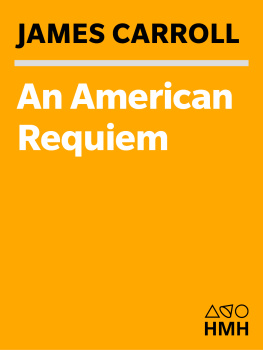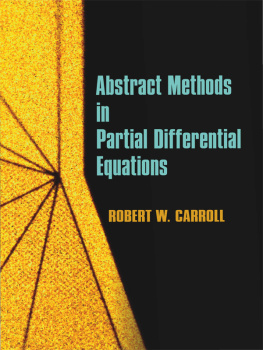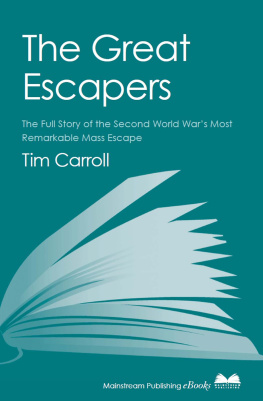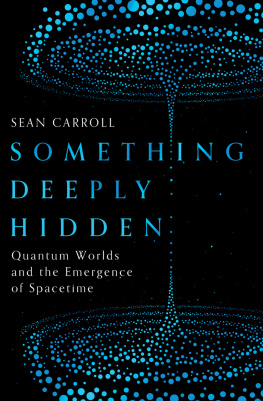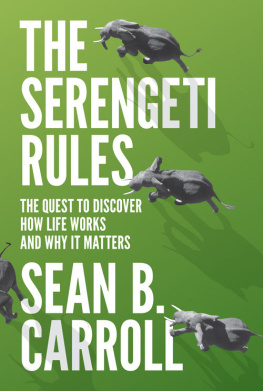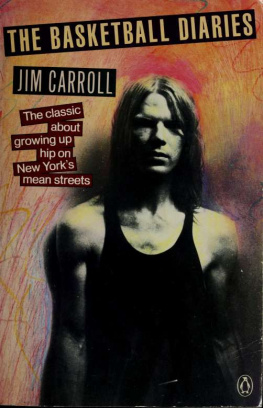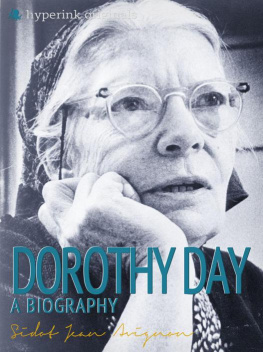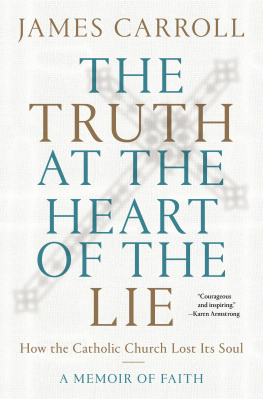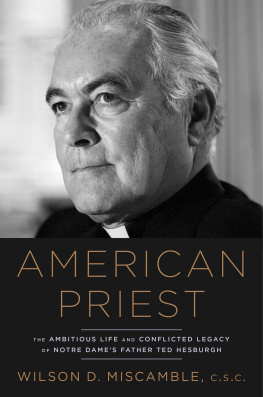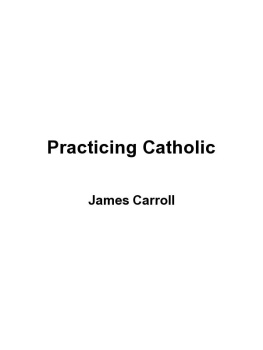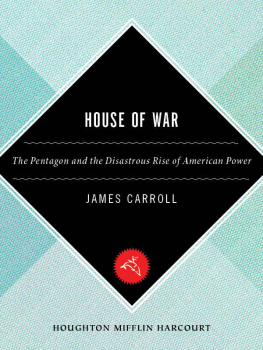Copyright 1996 by James Carroll
All rights reserved
For information about permission to reproduce selections from this book, write to Permissions, Houghton Mifflin Harcourt Publishing Company, 215 Park Avenue South, New York, New York 10003.
www.hmhco.com
Library of Congress Cataloging-in-Publication Data
Carroll, James, date.
An American requiem : God, my father, and the war that came
between us / James Carroll,
p. cm.
ISBN 0-395-77926-x
ISBN 0-395-85993-x (pbk.)
1. Carroll, James, 1943Family. 2. Novelists20th centuryFamily relationships. 3. Ex-priests, CatholicUnited StatesFamily relationships. 4. Vietnamese Conflict, 19611975Protest movementsUnited States. 5. Fathers and sonsUnited StatesBiography. 6. CatholicsUnited StatesBiography. I. Title.
PS 3553. A 764 Z 464 1996 95-52125 CIP
813'.54dc20
e ISBN 978-0-547-52454-2
v2.0114
The author is grateful for permission to quote from the following: Lines from Vapor Trail Reflected in the Frog Pond, from Body Rags by Galway Kinnell. Copyright 1965, 1966, 1967 by Galway Kinnell. Reprinted by permission of Houghton Mifflin Company. All rights reserved. Lines from Vietnamese, from Growing into Love by X. J. Kennedy. Reprinted by permission of Curtis Brown Ltd. Copyright 1969 by X. J. Kennedy. Lines from Death of Little Boys from Poems: 19221947 by Allen Tate. Copyright 1931, 1932, 1937, 1948 Charles Scribners Sons; renewed copyright 1959, 1960 Allen Tate.
For Lexa, Lizzy and Pat
Frontispiece
MY FATHER : not until years later did I appreciate how commanding was his presence. As a boy, I was aware of the admiring glances he drew as he walked into the Officers Club, but I thought nothing of them. I used to see him in the corridors of the Pentagon, where I would go after school and then ride home with him. I sensed the regard people had for him, but I assumed that his warmth and goodness were common to everyone of his rank. I had no way of knowing how unlikely was the story of his success, nor had I any way to grasp the difference between him and the other Air Force generals. He was as tall as they, but looked more like a movie actor. I saw him stand at banquet tables as the speaker at Communion breakfasts, at sports team dinners, and, once, at a German-American Friendship Gala in Berlin. His voice was resonant and firm. He approved of laughter and could evoke it easily, though he never told jokes. His mode of public speaking had a touch of the preacher in it. He brought fervor to what he said, and an open display of one naked feeling: an unrestrained love of his country.
A fluent patriot, a man of power. Grace and authority were so much a part of his natural temperament that I did not mark them as such until they no longer characterized him. His relationship with his sons was formalwe addressed him as sirbut there was nothing stern in his nature. He never struck us. He never thumped the table until the pressures of the age made it impossible not to. We always knew he loved us. The problem was his absolute assumption that the existing social context, the frame within which hed found his extraordinary success, was immutable. His belief in the world of hierarchy was total, and his sense of himself, as a father and as a general, depended on that worlds survival. Defending it was his one real passion, his vocational commitment, and his religious duty.
And yet. One early Sunday morning in winter, when I was perhaps twelve years old, he got up before dawn to drive me on my paper route. This was an unusual occurrence. I normally wrestled the papers onto my red wagon, even the thick Sunday editions. I hauled my own way in several cycles around our suburban neighborhood, Hollin Hills, a new subdivision in Alexandria, Virginia. But a savage storm had moved in the night before, and now the wind was howling. Sheets of rain and sleet battered the windows. We bundled up and waited inside the front door until my distributor arrived, late, in his panel truck. Then Dad and I hurried out to load my Washington Stars into the back seat of the Studebaker.
The windshield wipers kept getting stuck in the buildup of grainy ice, which we would scoop away as we returned from running the bulky papers up to the houses of my subscribers, Dad on his side of the street, me on mine. It was raw, unpleasant work, but that morning I loved it. Indeed, in my mind it was a game, a version of war, which we kids were always playing then. Those dashes from our car were sorties, I thought, bombing runs, commando raids. A stack of papersartillery shells, mines, grenadessat between us on the front seat. We would drive for fifty yards, jolt to a stop, snap into action. I would lean toward Dad, pointing through the fogged-up windows. I was the navigator, the bombardier. That one, that one. Then wed each bolt from the car, ducking into the freezing rain, splashing up driveways and across soggy lawns, propping the papers inside storm doors, then dashing away as if the things were going to explode. We achieved a brilliant synchrony, a teamwork that overstamped everything that might ever separate us. Drive. Stop. Fold. Open the door. Duck. Dash. Return. Way to go! Sir!
If my father had been the commander of a two-man suicide mission, Id have followed himnot out of any readiness to die but out of the absolute trustworthiness of what bound us at that moment. I would have sworn that time itself could not undo it. Neither principalities nor powers, nor things present, nor things to come... I was an altar boy over whose head Saint Paul usually sailed, but these words had lodged themselves in me.... nor height, nor depth, nor any other creature shall be able to separate us... Paul, of course, was talking about the love of God, but my only real faith then was in the good order of the world over which Dad presided. Him. Nothing would separate me from him. That morning was delicious for being just the two of us.
When wed almost finished, something hideous happened. My father had run up to a house and dropped the paper and was running back toward the car when the door of the house swung open.
Hey, you! a voice boomed. Even in that wind I heard the threat in it. This was on the far side of Hollin Hills, where the newer, smaller houses were. My distributor had signed these people up. I didnt know them. The voice was a mans, and it was laced with authority. Get back here, goddammit!
My father stopped and stood with his back to the man, still facing me. I searched his eyes to see what was in them, but the distance between us, and the rain, made it impossible to see.
Get your ass back here, I said. Put my paper where it belongs.
I looked across and saw that Dad had dropped the paper under the overhang protruding from the linteldry enough, but not quite at the threshold. I thought of making the dash myself, to spare us all. But then I saw, on a low post beside my father, a sign with luminous letters on it. Dad was looking at it too. M. Sgt. John Smith. Master Sergeant, I realized at once. The man was military. An NCO was barking orders at a general. A drill instructor bellowing at recruits.
Again I looked for Dads eyes, and though it seemed I found them, I could read nothing of his reaction. Mine was stunned enough for both of us. Caught! was the feeling. Captured! Now they shoot us. I was frozen to a spot near the rear bumper of our car. Rain and sleet pelted my face, my soaked clothing, my slimy skin, my watery bones. A shudder coursed through me, a fever and a chill at once.
Get back here, goddammit!
My fathers stare made me feel sure this was my fault. I started to sprint toward the house, to retrieve the paper and apologize. But as I was about to pass Dad, he put his hand up, stopping me. He turned and, with that low humping movementducking gunfire?he retraced his path up the sergeants driveway, dodging rivulets, scooting past a wheelbarrow and a mound of topsoil. Sergeant Smiths car was off to the side, and now I saw the bumper sticker identifying it with Fort Belvoir, an Army post a few miles away.
Next page
